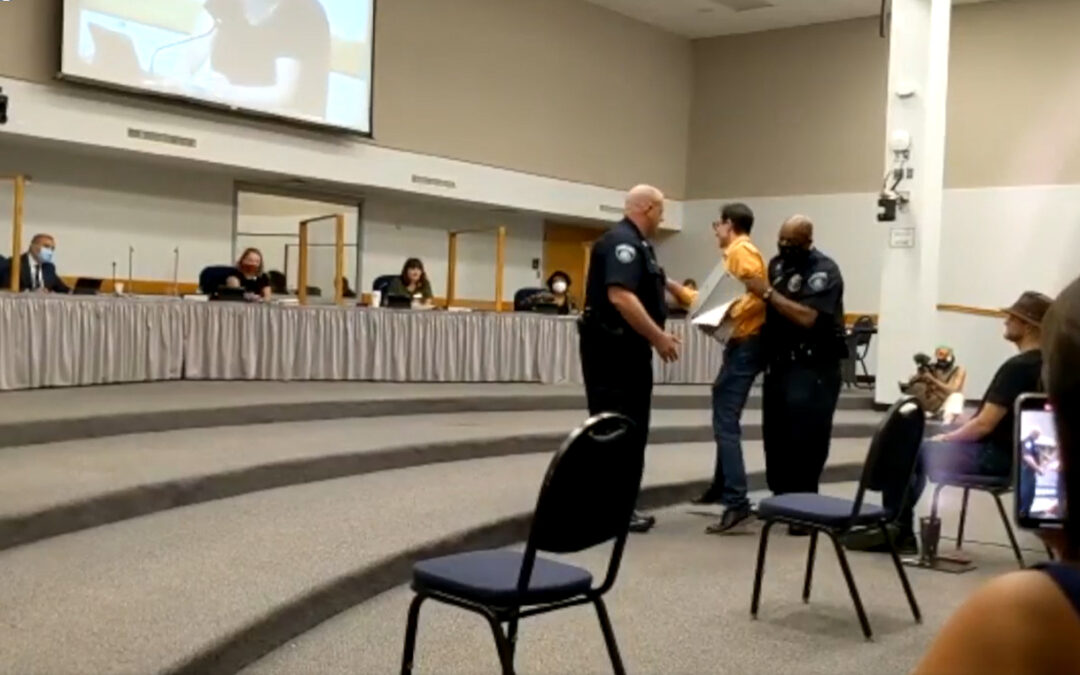There are many things the Government is empowered to do. There’s a list of them in the Constitution. A couple centuries of revision, a hundred-year-plus Progressive movement, and a few egregious moments of Supreme Court malpractice have expanded the list far beyond the original framework and intent.
Nevertheless, there are many things the Government is prohibited from doing. There’s a list of them in the Constitution, for starters, and a blanket prohibition against everything that’s not specifically allowed. The latter bit, the notion of Enumerated Powers, is routinely ignored by big-government types, but today’s matter is the former, the no-you-can’t list.
On that list – right at the top, for that matter – is the First Amendment:
Congress shall make no law respecting an establishment of religion, or prohibiting the free exercise thereof; or abridging the freedom of speech, or of the press; or the right of the people peaceably to assemble, and to petition the Government for a redress of grievances.
The speech clause gets the most attention, but no less important is the trailing clause, “the right of the people peaceably to assemble, and to petition the Government for a redress of grievances.”
Cf. the school board of the Round Rock Independent School District. Round Rock, home to about 125K residents, is part of the Austin metropolitan area, on the north side of Austin proper.
Readers may recall the seismic political reverberations of a heated exchange between a parent and the school board of Loudon County, VA, wherein the parent accused his daughter’s high school and the board of covering up her sexual assault by another student, the board having the parent arrested for disorderly conduct. This event illustrated the growing conflict between “government” in the form of those who run the schools and the parents of the students those schools exist to educate. The conflict ran all the way up to the Virginia Governor’s race, with the then-front-running Democratic candidate Terry McAuliffe uttering a (rare, for politicians) bit of honesty:
I don’t think parents should be telling schools what they should teach,
and proceeding to lose the election, shock the legacy media and left-o-sphere, and put real fear into the Democratic Party and its supporters ahead of next year’s mid-term elections.
Less-reported, but now appearing in my news feed, is a story of another parent, Dustin Clark, in the aforementioned Round Rock school district, being removed by police from a school board meeting this past August as he “produced evidence that the board had covered up an alleged assault by the superintendent, Hafedh Azaiez, against a mistress.” The report goes on to relate that the board locked most parents out of their next meeting, and after Clark and others protested, sent its police officers to arrest Clark and another parent, and put them in jail for disorderly conduct.
Yes, “its” police force. The Round Rock Independent School District has its own police department, and we’re not talking about a couple donut-and-coffee veterans of some big city police department coasting to their golden years. Twenty-nine uniformed officers and two police dogs.
School safety is obviously a high-profile matter, especially since 1999’s Columbine massacre, but using police to haul parents who raise inconvenient truths is not about school shootings.
Nor is the United States Attorney General weaponizing the FBI against such parents.
Which brings us back to the First Amendment. Parents, i.e. citizens of the United States, have every right to petition the government (i.e. school boards) for redress of grievances. Locking them out of meetings, having them hauled out by cops (i.e. the government) mid-sentence while voicing those grievances, and using federal resources (again, the government), is a blatant violation of the Constitution.
The excuse, that threats have been made, warrants investigation of those threats, and the presence of some sort of security in those meetings. However, it does not, and I cannot stress this enough, justify the stifling of petitioners, via lockout or removal, even when those petitioners get loud. Dustin Clark was not a threat.
It is part of a public servant’s job to listen to constituents’ grievances. It’s right there in the supreme law of the land, and it is a grotesque breach of duty to forcibly prevent their airing.
Unfortunately, the concept of public service has eroded badly. Far too few of our representatives, high- and low-level, remember that they sit in their positions of authority at the consent of the governed, and that they serve those governed.
The trappings of power attract certain personality types, and they’re often not good ones. As anyone who’s had to deal with a co-op board or a homeowner’s association likely knows, those jobs are often filled by small, selfish, petty people who enjoy wielding negative power over others. The smaller the government, the smaller the people that populate it.
This schools business is part of a broader rift in the political landscape. We have, on one side, those who want to govern and control others with a free hand and meek compliance from the governed. We have, on the other side, those who bristle at being controlled and micromanaged while being ignored. The latter are getting louder, and the former are responding with ever-more intransigent authoritarianism, and have demonstrated a ready willingness to use coercion, intimidation, and violence in its implementation.
Benjamin Franklin opined that “those who would give up essential Liberty, to purchase a little temporary Safety, deserve neither Liberty nor Safety.” This sentiment echoes in the infringement of liberty by a bunch of sniveling how-dare-you-challenge-me martinets, and is reinforced by their apologists on the Left and in the mainstream press. A mainstream press that is, hypocritically, the first to trot out 1A when its liberties are infringed.


Exactly, Peter! You nailed this on all fronts.